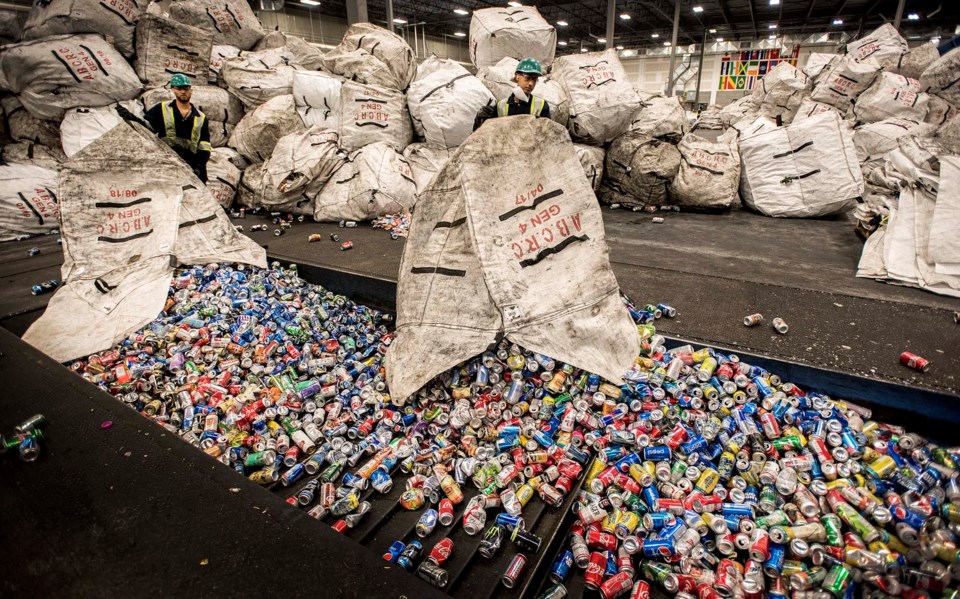Albertans could save tens of millions of dollars and keep 25 per cent more trash out of the landfill if the province brings in extended producer responsibility laws, municipal leaders heard this week.
About 90 people heard City of Calgary Coun. Peter Demong speak Thursday at the Edmonton Convention Centre on the impact of extended producer responsibility (EPR) laws in Alberta.
Demong and the City of Calgary are spearheading a baseline study backed by the AUMA on EPR in this province and presented some of their initial results as part of the 2019 Alberta Urban Municipalities Association convention.
Calgary, St. Albert, and many other communities have had to spend more to recycle less through curbside programs in recent years due to tighter trade rules in China, Demong said. His own city recently spent $300,000 to store 2,000 tonnes of plastic clamshell packages that recyclers no longer wanted – they finally had to landfill the material this summer for even more money.
Yet many of those clamshells were rejected because their producers stuck labels to them, he noted. If producers had been the ones responsible for the clamshells, maybe they’d have said, “Geez, maybe we should stop putting these stupid stickers on,” and put out products that could be recycled.
That’s the idea behind EPR, Demong explained: instead of having municipalities clean up after producers, make producers responsible for the waste their products create. That gives them a financial incentive to not only create easy to recycle products, but also to collect as much of that waste material as possible to reuse in new goods.
“As soon as there’s a dollar value associated (with waste), business can find a better way to do things,” he said.
“We’re asking for capitalism to move into recycling.”
A triple-win
EPR is any system that puts the cost of managing a product at the end of its life on the producer rather than government. While it can be voluntary, it’s usually backed by law with penalties and waste-diversion targets.
Alberta has legislated EPR programs for beverage containers, electronics, paint, and used oil, but unlike every other province west of Quebec, does not have one for packaging (glass, plastic, metal and paper).
Albertans paid into the roughly $367 million collected by industry in 2016 for Canada’s EPR programs for packaging but didn’t see any benefit from it, Demong said.
“The big boys – the Unilevers, the Proctor and Gambles, the Loblaws – price their products nationwide,” he explained, and they build the cost of EPR into their products – typically less than a cent per unit.
Albertans pay that cost, but since we don’t have EPR for packaging, we also have to pay an additional cost to set up our own recycling systems, he said – we pay twice for the same amount of recycling.
Demong and the AUMA are lobbying for Alberta to bring in an industry-run EPR system similar to the one in B.C.
“In an EPR program, the producer will now pay for that blue bin to be picked up,” Demong said – not the taxpayer.
Big business wants EPR so it can have consistent rules nation-wide, Demong said. Municipalities want it so they won’t have to manage waste – the Recycling Council of Alberta estimates Alberta communities could save up to $70 million a year with EPR for packaging. Residents want to stop getting double-billed.
Initial results from the baseline study suggest that Alberta could keep some 25 per cent more material out of the landfill with EPR for packaging and prevent some 150,000 tonnes of greenhouse gas emissions a year (equivalent to 30,000 cars off the road), said Jason London of the City of Calgary’s waste and recycling branch. Such a system could create jobs, cut costs, and establish common, easy to understand recycling rules for all Albertans.
“This is a win-win-win,” Demong said: you’ve got less environmental impact, less costs to consumers, and less red tape for government (as you have one recycling system instead of many).
Demong encouraged residents to lobby their MLAs to bring EPR for packaging to Alberta.




